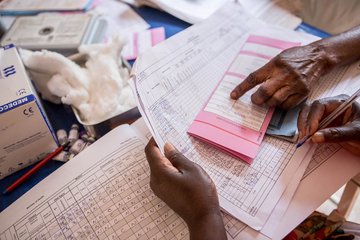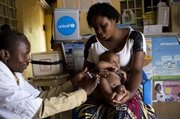Learn about different preventable diseases and why vaccination is so important
Vaccines save lives. Measles vaccines alone are estimated to have prevented over 21 million deaths between 2000 and 2017. Wherever children are not vaccinated, their lives and their communities are at risk.
Vaccines now protect more children than ever before, but nearly one in five infants misses out on the basic vaccines they need to stay alive and healthy.
Low vaccination coverage among poor and marginalized children compromise gains made in all other areas of maternal and child health.
Front-line workers have a key role to play in educating parents and the general population about the benefits of vaccination.
Vaccination prevents illness, disability and death from vaccine-preventable diseases including cervical cancer, diphtheria, hepatitis B, measles, pertussis (whooping cough), pneumonia, polio, rotavirus diarrhoea, rubella, meningitis and tetanus.
You can find more information on the different vaccine-preventable diseases in the list below.
<u>DIPHTERIA</u>
Diphtheria is an infectious disease which primarily infects the throat and upper airways, and produces a toxin affecting other organs.
The illness has an acute onset and the main characteristics are sore throat, low fever and swollen glands in the neck, and the toxin may, in severe cases, cause myocarditis or peripheral neuropathy.
The disease is spread through direct physical contact or from breathing in the aerosolized secretions from coughs or sneezes of infected individuals.
Why is vaccination against Diphtheria so important?
Vaccination against diphtheria has reduced the mortality and morbidity of diphtheria dramatically, however diphtheria is still a significant child health problem in countries with poor vaccination coverage. In countries endemic for diphtheria, the disease occurs mostly as sporadic cases or in small outbreaks. Diphtheria is fatal in 5 - 10% of cases, with a higher mortality rate in young children. Treatment involves administering diphtheria antitoxin to neutralize the effects of the toxin, as well as antibiotics to kill the bacteria.
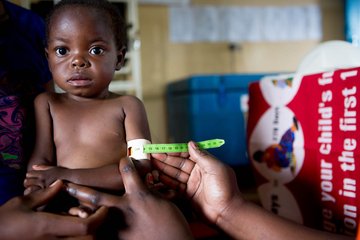
<u>HIB</u>
Haemophilus influenza type b (Hib) is a bacteria responsible for severe pneumonia, meningitis and other invasive diseases almost exclusively in children aged less than 5 years.
It is transmitted through the respiratory tract from infected to susceptible individuals. Hib also causes potentially severe inflammatory infections of the face, mouth, blood, epiglottis, joints, heart, bones, peritoneum, and trachea.
Why is vaccination against Hib so important?
Vaccines are the only public health tool capable of preventing the majority of serious Hib disease.
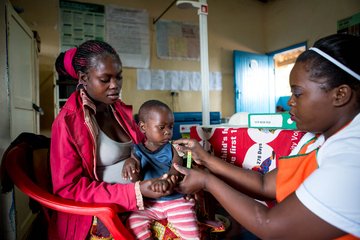
<u>HEPATITIS B</u>
Hepatitis B is a viral infection that attacks the liver.
Why is vaccination against Hepatitis B so important?
The Hepatitis B virus (HBV) is highly infectious and spreads through contact with an infected person’s blood or body fluids.
Infection can occur as early as birth, when mothers pass on the disease to their babies. Other primary means of HB infection include: child-to-child transmission (from children being in contact with one another in household settings), contaminated blood transfusions, unsterile needles and sexual activity.
Hepatitis B infection is a primary cause of liver cancer.
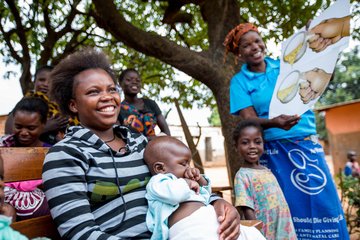
<u> HPV</u>
Human papillomavirus (HPV) is the most common viral infection of the reproductive tract, and can cause cervical cancer, other types of cancer, and genital warts in both men and women.
HPV is a group of more than 100 viruses, of which 13 can cause cancer. Nearly all cases of cervical cancer are attributed to HPV.
Why is vaccination against HPV important?
Globally, cervical cancer is the second most common form of cancer in women, with an estimated 530,000 new cases a year, resulting in an estimated 266,000 deaths.
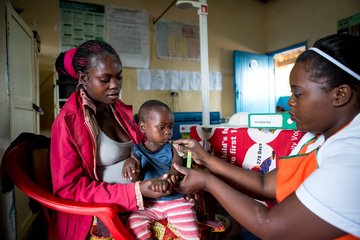
<u>MEASLES</u>
Measles is a highly contagious disease caused by a virus, which usually results in a high fever and rash, and can lead to blindness, encephalitis or death.
Why is vaccination against Measles important?
Measles is life threatening in low-income countries where children have limited or no access to medical treatment and are often malnourished. Measles outbreaks are particularly deadly during emergency settings in communities experiencing, or recovering from, conflict or natural disaster.
Children are especially vulnerable to deadly infections – 367 children die from measles every day, despite the availability of a safe, effective and affordable vaccine. Measles survivors are often left with lifelong disabilities, such as blindness, deafness or brain damage.
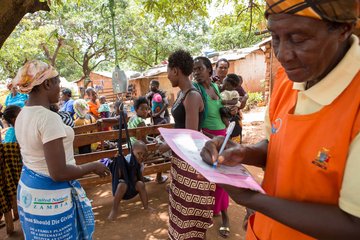
<u>MENINGITIS A</u>
Meningitis A is an infection that can cause severe brain damage and is often deadly. The disease can kill or cause severe brain damage within hours.
Why is vaccination against Meningitis A so important?
An outbreak of meningitis A in 1996 infected over 250 000 people and killed over 25 000 in just a few months. Outbreaks of Meningitis A were regularly occurring in countries from Senegal to Ethiopia, killing thousands of individuals children and adults in just a few weeks. Repeated massive vaccination campaigns with a Men A vaccine, have shown impressive positive results.
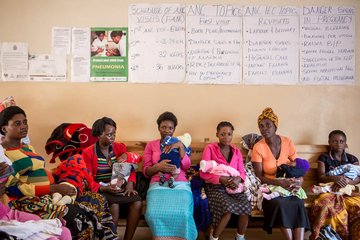
<u>PERTUSSIS (WHOOPING COUGH)</u>
Pertussis is a highly contagious disease of the respiratory tract caused by a bacteria that lives in the mouth, nose, and throat.
Many children who contract pertussis have coughing spells that last four to eight weeks. The disease is most dangerous in infants and spreads easily from person to person, mainly through droplets produced by coughing or sneezing. Untreated patients may be contagious for three weeks or more following onset of the cough.
Why is pertussis vaccination so important?
The main aim of pertussis vaccination is to reduce the risk of severe pertussis in infancy. WHO estimates that in 2008 global vaccination against pertussis prevented approximately 687 000 deaths.
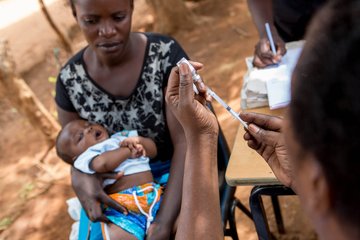
<u>PNEUMONIA and other pneumococcal diseases</u>
Pneumococcal diseases which include pneumonia, meningitis and bronchitis are caused by the same bacterium that is transmitted mainly through respiratory droplets and colonizes the back of the nose.
Why is pneumonia vaccination important?
Pneumonia kills nearly 1 million children under the age of five around the world, causing more deaths than HIV/AIDS, diarrhea and malaria combined.
Progress in the fight against the disease has been slow compared to progress in other leading diseases. Childhood pneumonia deaths have fallen by just 50 per cent compared to an 85 per cent decline in measles deaths, and 60 per cent in deaths from malaria, AIDS and tetanus in the last 15 years.
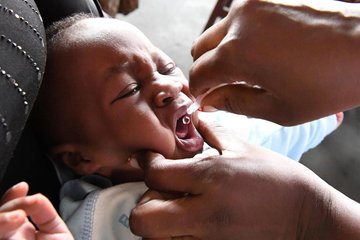
<u>POLIO</u>
Polio is a highly infectious viral disease that can cause irreversible paralysis.
Why is polio vaccination important?
Polio-free countries have been infected by imported virus, and all countries – especially those experiencing conflict and instability – remain at risk until polio is fully eradicated.
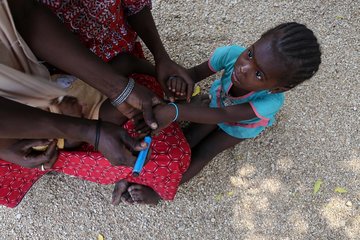
<u>ROTAVIRUSES</u>
Rotaviruses are the most common cause of severe diarrhoeal disease in young children throughout the world.
More than 215,000 children under-five die annually from rotavirus infections, which infect nearly every child at least once before the age of five, with children aged six months to two years most vulnerable to infection.
Why is rotaviruses vaccination so important?
Diarrheal diseases are both preventable and treatable, and yet remain the second leading cause of under-five mortality, killing an estimated 525,000 children under the age of five years annually.
Rotaviruses alone are responsible for 25 to 50 per cent of all severe diarrheal cases globally.
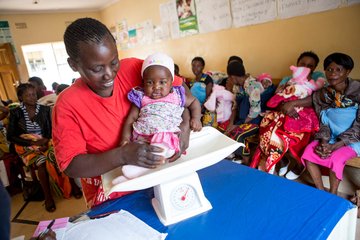
<u>RUBELLA</u>
Rubella is a viral disease which is usually mild in children, but infection during early pregnancy may cause fetal death or congenital rubella syndrome, which can lead to defects of the brain, heart, eyes, and ears.
Why is rubella vaccination so important?
Rubella is usually a mild infection, but for women during early pregnancy, rubella can seriously affect the foetus, resulting in miscarriage and the combination of disabilities collectively called congenital rubella syndrome (CRS), which includes heart disease, blindness and deafness.

<u>TETANUS</u>
Tetanus is caused by a bacterium that is present in the environment irrespective of geographical location, which grows in the absence of oxygen, for example in dirty wounds or in the umbilical cord if it is not kept clean. Maternal and neonatal tetanus (MNT) is a swift and painful killer disease that kills a significant number of newborns and women every year.
Why is tetanus vaccination so important?
Once the disease is contracted, the fatality rate can be as high as 100% without hospital care and between 10% to 60% with hospital care.

<u>YELLOW FEVER</u>
Yellow fever is a mosquito-borne disease that is endemic in countries in Central, West and East Africa, as well as in the South and Central Americas region.
Symptoms of yellow fever include fever, headache, jaundice, muscle pain, nausea, vomiting and fatigue.
Why is Yellow fever vaccination so important?
Some patients who contract the virus develop severe symptoms and approximately half of those die within 7-10 days.


